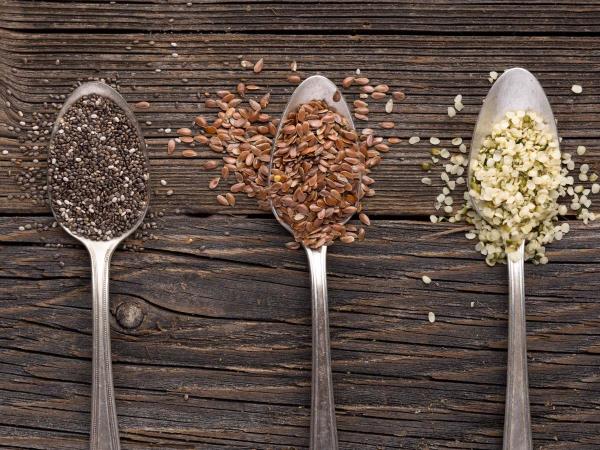- Flax Seeds
We start the day like kings with flax seeds. They have a high fiber content, plenty of omega-3 fatty acids, also containing ALA (alpha-linolenic acid) and lignans. Both are powerful antioxidants that help lower cholesterol and reduce inflammation. Just one tablespoon of ground flax seeds contributes a large portion of these beneficial substances.
Nutritional Facts: In 100g of flax seeds, there are around 28g of fiber, 42g of fats (mostly omega-3), and 20g of proteins. In total, it provides about 534 kcal of energy. For the best nutrient absorption, it is recommended to grind the seeds instead of consuming them whole. Research shows that consuming more than 30g of flax seeds daily, for at least 12 weeks, helps reduce body weight, body mass index, and waist circumference, especially in people with a BMI above 27.
- Hemp Seeds
Hemp seeds boast an exceptionally balanced nutritional profile. In 100g, you can find 31g of proteins, approximately 49g of fats, and only 5% water and 5% carbohydrates. The proteins in them are highly digestible and contain all essential amino acids, which is rare in plant sources.
If, for example, we eat 3 tablespoons of hemp seeds (about 27g), we get over 9g of proteins and only 1g of fiber, less than flax or chia seeds, but they contain more proteins. Hemp seeds also contain rare plant nutrients with gamma-linolenic acid (GLA), which has anti-inflammatory effects.
- Chia Seeds
Chia seeds have been a part of everyday life since the time of the Mayans and Aztecs. Originally known from Mesoamerican culture, they are now considered real powerhouses of fiber, omega-3 fatty acids, and minerals.
100g of seeds contains around 486 kcal, 42% carbohydrates (high in fiber), 16% proteins, and 31% fats.
As an interesting fact, chia seeds can absorb up to 12 times their weight in liquid and swell into a gel. This allows them to form a gel-like mass, which has incredibly positive effects. Approximately 2 tablespoons of chia seeds contain 10g of fiber and 5g of proteins, almost the same as flax seeds, but with significantly more fiber.
A nutritional study from 2025 conducted among North American experts highlights chia seeds as a source of fiber and calcium since just one tablespoon of seeds contains more fiber than a slice of whole grain bread. This aids digestion, strengthens bones, and promotes heart health. Even a small amount of chia seeds contributes to better gut microbiota, blood sugar regulation, a feeling of fullness, and reduces inflammation.
Why is it advisable to add them to any dish?
Chia, flax, and hemp seeds blend well with yogurts, fit into all types of smoothies, are excellent in bread made from them, cookies... With a bit of imagination, you can also use them as a pudding gel, as an egg substitute in baking (chia gel!), and in general, they provide energy, proteins, healthy fats, and fiber.
All three seeds also contain substances that are not thoroughly researched, but scientists are excited about their effects:
- Lignan: an antioxidant found in plants that helps reduce cholesterol, inflammation, and acts as a natural brush that cleanses the body.
- ALA (alpha-linolenic acid): a plant version of omega-3 fatty acids, which the body can convert into beneficial forms, supporting the heart and brain functions.
- GLA (gamma-linolenic acid): an anti-inflammatory fat, rare in plant sources, making hemp seeds so special. In general, it soothes inflammation, pain, and tension.
- Hygroscopic properties of chia seeds mean they absorb a lot of water. When they do this, they become gel-like. Because of this, the Mayans and Aztecs liked to use them as an energy food, similar to a natural quick battery charger.
All three seeds are among the most nutrient-rich plant supplements that can be included in the diet. Flax provides you with fiber, omega-3, and lignans, chia seeds with additional fiber, minerals, and gel-like structure, and hemp with a balanced profile of proteins and anti-inflammatory fats.
And one more thing: studies show that flax aids in weight loss and cholesterol reduction, chia supports digestion and gut mood, and hemp is an excellent source of plant-based proteins for vegans and vegetarians.
It's worth incorporating them into daily nutrition. If possible, all three together.









 Would you like to be informed about news on the website?
Would you like to be informed about news on the website?

